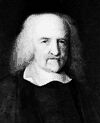- Hobbes, Thomas
- ► (1588-1679) Filósofo inglés, discípulo de Bacon. En su segundo viaje al continente (1629-1631) conoció los Elementos de Euclides, que le llenaron de entusiasmo y fijaron la orientación matematizante de su pensamiento. En su tercer viaje, conoció a Galileo, que le ayudó a llegar a la conclusión de que el movimiento es fundamental para explicar el mundo físico, y también al hombre y la sociedad. Escribió un tratado político, Leviathan, donde postula que el hombre es el lobo del hombre. Fue materialista y propugnó un Estado fuerte como la mejor forma de gobierno.
* * *
(5 abr. 1588, Westport, Wiltshire, Inglaterra–4 dic. 1679, Hardwick Hall, Derbyshire).Filósofo y teórico político inglés. Hijo de un vicario que abandonó a su familia, Hobbes fue criado por un tío. Después de graduarse en la Universidad de Oxford se convirtió en tutor y viajó con su pupilo por Europa, donde sostuvo discusiones filosóficas con Galileo acerca de la naturaleza del movimiento. Más tarde se volcó hacia la teoría política, pero su apoyo al absolutismo lo puso a contrapelo con el creciente sentimiento contrario a la monarquía de su época. Huyó a París en 1640, donde fue tutor del futuro rey Carlos II de Inglaterra. En París escribió su obra más conocida, Leviatán (1651), en la cual intentó justificar el poder absoluto del soberano sobre la base de un hipotético contrato social en el que las personas buscan protegerse unas de otras acordando obedecer al soberano en todo orden de cosas. Hobbes retornó a Gran Bretaña en 1651 después de la muerte de Carlos I. En 1666, el parlamento amenazó con investigarlo por su ateísmo. Sus obras se consideran una importante exposición de las nacientes ideas del liberalismo, así como de los antiguos supuestos del absolutismo característico de la época. Thomas Hobbes, detalle de una pintura al óleo de John Michael Wright; National Portrait ...Courtesy of the National Portrait Gallery, London
Thomas Hobbes, detalle de una pintura al óleo de John Michael Wright; National Portrait ...Courtesy of the National Portrait Gallery, London
Enciclopedia Universal. 2012.
